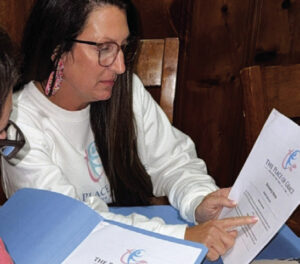Voters to decide on one-cent tax
With the March 13 primary just days away, school officials are hoping the citizens of Franklin County will make it a point to support the city and county school systems by voting to keep the one-cent sales tax in place for another two years.
The issue will appear on the back side of both the Democratic and Republican primary ballots and Franklin County Schools Superintendent Gary Williams said it’s an important issue for voters to consider.
The one-cent sales tax, which was implemented in 2010, has provided additional revenue for both the Franklin County and Russellville City school systems, which school officials said was desperately needed.
“We have a financially strapped school system to begin with, but in the past three years, we’ve been cut 23.5 percent in proration,” Williams said. “That comes out to roughly $5 million we’ll never see again because that money won’t be made up. It will take us years to recover from those kinds of cuts and it will be impossible without the help of this one-cent sales tax.”
Russellville City Schools Superintendent Rex Mayfield said his school system faced a similar situation.
“Since the 2008-2009 school year, we faced 23.5 percent proration that came out to nearly $3 million in cuts for our school system,” Mayfield said. “The one-cent sales tax helps us tremendously to try to bridge the gap between the money we’ve been cut and what we need to have.”
The county schools receive 52 percent of the revenue generated from the tax and the city schools receive 48 percent.
According to Russellville City Schools officials, the one-cent tax generated $857,009 from July 2010 through June 2011. County school officials said their system received about $1.2 million over that same time period.
“The money from this one-cent tax helps us take care of the good bit of debt we have,” Williams said. “The state money we do get goes for bills and payroll and we’re just barely squeaking by as it is.”
Williams said many teachers pay for classroom supplies out of their own pockets because they no longer receive the $525 to use toward supplies and the school system simply doesn’t have the money to help them with costs for supplies or other things such as professional development through workshops.
“It’s important for us to get that debt paid down so we can start using the sales tax money to help our teachers and help in other areas,” Williams said. “It’s not fair that they have to spend money out of their own pockets for supplies and that they have to foot the cost for things like professional workshops when they want to better themselves and learn new things in order to be a better teacher.
“Our teachers do such a great job with the little they have but we want to help them as much as we can. We just really need to have the one-cent sales tax in order to do that.”
Mayfield said the money the city school system receives goes towards payroll and support for teaches and is vitally important to being able to retain the teachers they currently have.
“We still have seven and a half less teachers than we had in 2008 but the money we’ve received from this sales tax has allowed us to maintain the amount of teachers we currently have,” Mayfield said.
“I in no way mean for this to sound threatening, but the reality is that if this one-cent sales tax doesn’t pass again, we’ll be forced to cut jobs. It’s definitely not something I want to do, but we won’t have any choice if we don’t have the money to pay for them.
“Losing teachers would be detrimental to our students and to our county as a whole, so this is definitely an important issue.”
Williams said funding for textbooks is another of the areas included in the 23.5 percent proration cuts. He said the county school system has lost about $400,000 for textbooks over the last three years.
“The bottom line is, we want to be able to have the best supplies and resources for our students, but these things take money,” Williams said. “Our school systems are one of the most important things in the community because it’s one of the main things people or industries look at when they are considering relocating to the area.
“The citizens have got to support our schools if we want to continue to have a successful community in the years to come.”













